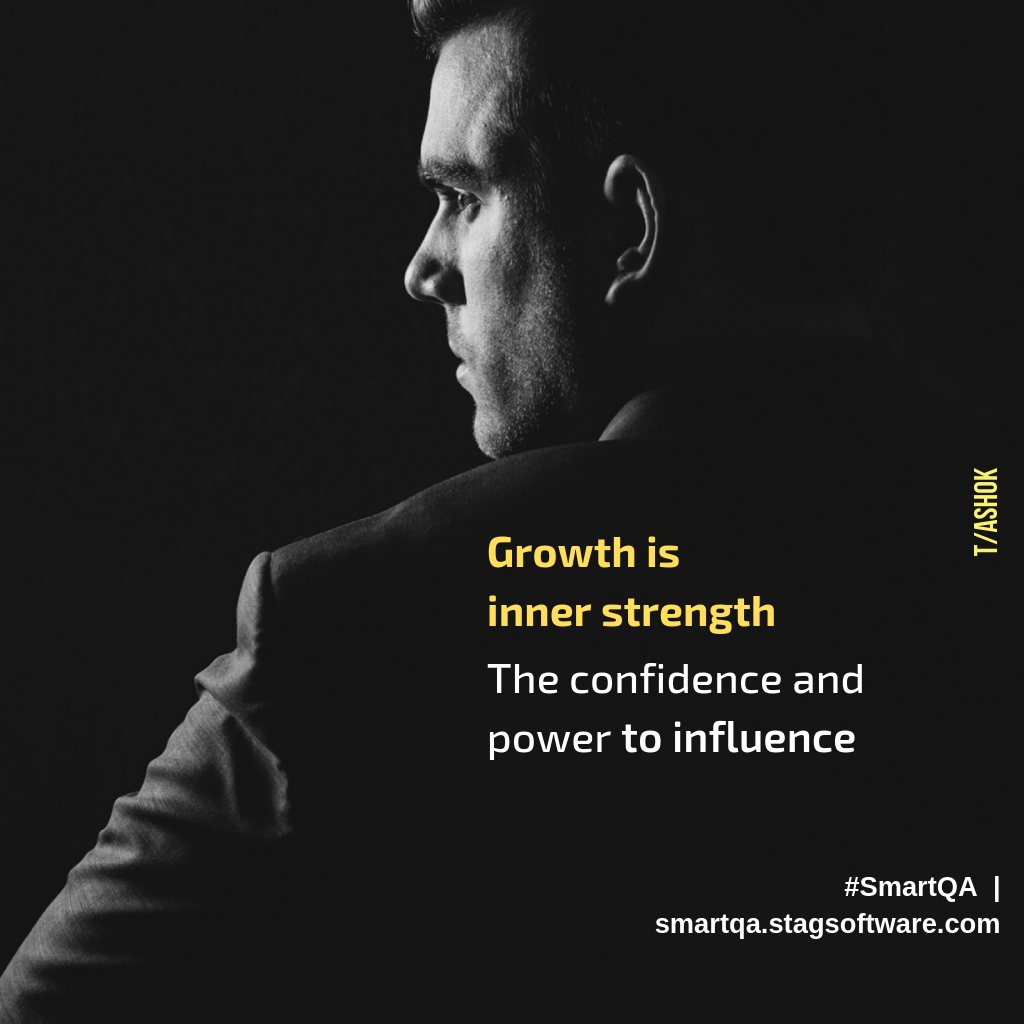T Ashok, @ash_thiru
Summary:
What is growth? Is it money, position, power or the confidence to get anything done? Growth is not just knowing more, it is about deep understanding aided by reflection that allows us to assimilate. Growth is not merely external, it is building inner strength, to influence positively.
In conversations with test professionals I come across questions that relate to career growth – “How do I grow in testing? What should I do to grow? What areas in testing should I pursue to grow quickly? …”. These are interesting conversations as there are no specific answers.
Let us dig a little deeper to understand what career growth may mean. Is growth about earning more money? About better designation? Or more ‘power’ in terms of larger project/team size…? I bet your answer will be “All of these”. Hmmm, these are outcomes of growth, but the question still remains – “What is growth?”. Is it deeper knowledge? Or skills/abilities? Or is it the confidence to get anything done?
I would like to believe that the last one is most appropriate. It is about having the confidence of getting anything done. If you can handle stuff that is more fuzzy, difficult, constrained, large, with huge expectations, then you grow faster and higher.
It is not just doing work, it is about getting work done. It is about being a leader. Take a minute and reflect. A young baby needs support to get things done, as he grows, he manages to be self-sufficient. As he becomes a young adult, he is able to manage others and later as an adult when he establishes his family, he leads, not just manage.
As you grow this is what happens : Managing yourself –> Managing others(or things) –> Leading (others/things). The ability to “do”, “manage doers” to “leading doers” is what defines growth. Initially it is about managing, later evolving into leadership.
Leadership is about influencing others. It is about believing in yourself and not really care about what others think. A far cry from being dependent on what others think about you to figure out if you are good. It is about having belief and confidence in yourself. It is not about ‘toeing’ the line, it is about leading. It is not just agreeing to other’s view, it is about having healthy arguments to put forth your views/thoughts.
Bodily growth cannot happen when you just eat more, it happens only when the food is digested and assimilated. Likewise, it is not about just knowing more, it is about deep understanding aided by reflection that allows us to assimilate. This results in more than just knowing, it is about forming heuristics as when to/not-to apply, akin to absorbing and purging, resulting in one to becoming confident in the application of knowledge.
Growth is evolution and evolution is “Add/Modify/Delete”. Visible external growth is “Add”, the accumulation of mere knowledge. Real ‘internal’ growth is “Modify/Delete”, the assimilation that changes the internals, and purgation, the “Delete” that discards old views/ideas, strengthening you from inside. Growth is not merely external, it is building inner strength.
With inner strength comes confidence and the power to influence. To influence the project team we work with. To influence the product we are building. To influence the company where we work. To influence the customer who uses our product. To influence the test & software engineering community.

The expanding spheres of influence :
Individual “I” –> Project team “US” –> Product “OURS” –> Company “US & OURS” –> Customer “THEM” –> Community “WE”.
Now you do not care about what others think. You have grown. Stuff happens. You do not ‘just do actions and get things done’. You deliver ‘business value’. You feel good. And possibly get noticed. Anyways you enjoy what you have done. And the wonderful outcomes of growth happen.
About SmartQA The theme of SmartQA is to explore various dimensions of smartness to leapfrog into the new age of software development, to accomplish more with less by exploiting our intellect along with technology. Towards this, we will strive to showcase interesting thoughts, expert industry views through high-quality content as articles, posters, videos, surveys outlined as a SmartQA Digest weekly emailer. SmartBites is soundbites from smart people”. Ideas, thoughts and views to inspire you to think differently.
